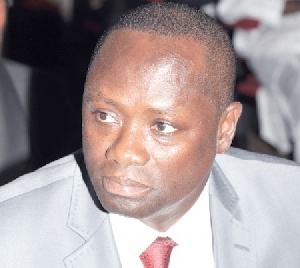- Home - News
- TWI News | TV
- Polls
- Year In Review
- News Archive
- Crime & Punishment
- Politics
- Regional
- Editorial
- Health
- Ghanaians Abroad
- Tabloid
- Africa
- Religion
- Election 2020
- Coronavirus
- News Videos | TV
- Photo Archives
- News Headlines
- Press Release
General News of Tuesday, 11 November 2014
Source: The Chronicle
Exposed: $9.35bn oil cash in foreign hands
The initial hopes of Ghanaians that the discovery and exploration of oil in the Cape Three Points Basin will signal a turnaround of the country’s deplorable economic condition is gradually becoming a mirage.
Just as gold and other rich mineral resources have failed to rescue the country and improve the lives of its people, the black gold, the most expensive economic commodity on the global market, has almost joined the bandwagon of economic failures of the country.
Ghana, once again, seems to be at the receiving end of yet another multilateral fleecing, as available records show how foreign partners at the Jubilee Field, Ghana’s first rich oil site, have been ripping the country off its natural resources.
A report by the Ghana Institute of Governance and Security (GIGS), a policy think tank, paints a sad picture of foreign allies bagging a whopping 80% of profits accrued from the oil field, leaving just a paltry 20% to Ghana.
Expatriate contractors at the field have grabbed $9.35 billion of revenue proceeds since commencement of production three years ago, whilst the country has only made just $2.340 billion gross profit.
What appears worrying is the fact that the situation is self-inflicted, since the leadership of the country has failed to push for a more favourable agreement that will ensure that Ghana benefits immensely from the oil field.
The financial death warrant is, however, waiting to be signed, and GIGS is warning that the country could further lose additional $82 billion over the entire life of Jubilee Fields, if Parliament does not amend the Petroleum and Production Bill in its current form.
According to the policy think tank, which has been battling the government and other stakeholders for some time now over some loopholes in the bill, Ghana will continue to remain a ‘Guinea Pig in Africa’ if the Modern Concession Agreement is not changed for the more favourable and profitable Production Sharing Agreement(PSA).
According to the group, its study indicates that Ghana could accrue $86,025,000,000, representing 49.70% of total revenue, as against the conservative $20,269,000,000 and $19,390,000,000 projected by the International Monetary Fund (IMF) and World Bank (WB) respectively.
The two figures by the IMF and World Bank represent just 11.58% and 11.08% of total revenue to be obtained by Ghana by the time foreign contractors pack bag and luggage out of the country.
GIGS CONCERNS
The Ghana Institute of Governance and Security believes the Ghanaian leadership is being hoodwinked into signing the Petroleum Exploration and Production Bill, which, when passed into law by Parliament, could have dire consequences on governance and security.
The organisation contends that fiscal provision in the Bill, which is modelled on Modern Concession, a hybrid between the old traditional concession and Production Sharing Agreement, will never make Ghana derive the full maximum benefits from the oil and gas resources God has given the country.
According to GIGS, the modern concession is equally exploitative as the old traditional concession, stressing that despite the inclusion of the Carried and Participation interests, it is still far below the benefits that would have accrued, should Ghana adopt the Production Sharing Agreement.
“The passage of the bill into law would amount to surrendering our sovereignty and constitutional ownership and our birth rights over the oil and gas wealth, once again; the manner we treated our gold and other minerals in the past and up to today,” Mr. David Agbee and Solomon Kwawukume, Executive Director and Senior Research Officer of GIGS respectively, argued in the report.
According to them, they find it exceedingly baffling that the Ministries of Energy, Lands and Mineral Resources and other relevant stakeholders have refused to heed warnings from concerned civil societies and individuals, including Ghana’s own illustrious son, Mr. Kofi Annan
“Mr. Kofi Annan, in an Africa Progress Panel, 26 September, 2013, stated that Africa’s Natural Resource Wealth Rights belongs to the continent’s citizens, but the citizens are being robbed of its benefits by revenue diversion, corruption, jobless growth, and rising inequality,” they noted.
They argued that the introduction and application of the pure PSA would be in the best interest of the nation, as it would ensure that she benefits from her oil and gas resources. “Ghana would have earned over US$4 billion at the end of December 2013, and over US $5 billion, as at the end of June 30, 2014, under PSA,” GIGS emphasised.
The policy think tank stated further that it had observed that the spirit and intent of PNDC Law 64 and 84, which were the existing laws governing the upstream oil industry before the discovery of oil is the Production Sharing Agreement, but how leaders of this country deviated from such favourable path, and decided to adopt the Modern Concession, is something Ghanaians should be concerned about.
Lessons from other oil producing countries
The Ghana Institute of Governance and Security contends further that its strong position on the need for Ghana to push for the PSA is based on the fact that countries that have adopted such an agreement are yielding maximum benefits from their commodities.
According to them, about 81 countries across the world have hooked onto the Production Sharing Agreement, stressing that the return benefits to their respective governments have been overwhelming.
The countries include 34 in Africa, 12 in Asia & Australia, 8 in Central America & Caribbean, and 7 Seven in South America.
The African countries include oil giants such as Nigeria, Angola and neighbouring Cote d’Ivoire, which have massively realised enough benefits from the commodity under the PSA.
“We, therefore, entreat Government of Ghana to learn from the examples of these neighbouring African countries, before making any decision that will bring untold hardships to the later generation,” GIGS cautioned.
CHALLENGE
Meanwhile, the organisation has thrown a challenge to sister Civil Society Organisations (CSOs) and government agencies to boldly publish how much revenue will accrue to Ghanaians from the Jubilee Field during its entire lifetime.
Amongst the organisations the GIGS is challenging, include the Africa Centre for Energy Policy (ACEP), Ghana Oil and Gas Technical Committee (GOGTC), Institute of Economic Affairs (IEA), Centre for Energy Policy Analysis (CEPA), Oxfam America, IMANI Ghana, and Petroleum Commission.
Others are Ministry of Energy, Energy Commission, Parliamentary Select Committee on Energy and Petroleum, ISODEC, and Friedrich Ebert Foundation, amongst others.











